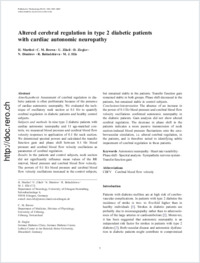Altered cerebral regulation in type 2 diabetic patients with cardiac autonomic neuropathy
- Marthol, H. Department of Neurology, University of Erlangen-Nuremberg, Germany
- Brown, Clive M. Department of Medicine, Division of Physiology, University of Fribourg, Switzerland
- Zikeli, Udo Department of Neurology, University of Erlangen-Nuremberg, Germany
- Ziegler, D. German Diabetes Clinic, German Diabetes Center, Leibniz Center at the Heinrich Heine University, Düsseldorf, Germany
- Dimitrov, N. Department of Neurology, University of Erlangen-Nuremberg, Germany
- Baltadzhieva, R. Department of Neurology, University of Erlangen-Nuremberg, Germany
- Hilz, M. J. Department of Neurology, University of Erlangen-Nuremberg, Germany
-
29.08.2006
Published in:
- Diabetologia. - 2006, vol. 49, no. 10, p. 2481-2487
English
Aims/hypothesis Assessment of cerebral regulation in diabetic patients is often problematic because of the presence of cardiac autonomic neuropathy. We evaluated the technique of oscillatory neck suction at 0.1 Hz to quantify cerebral regulation in diabetic patients and healthy control subjects.Subjects and methods In nine type 2 diabetic patients with cardiac autonomic neuropathy and 11 age-matched controls, we measured blood pressure and cerebral blood flow velocity responses to application of 0.1 Hz neck suction. We determined spectral powers and calculated the transfer function gain and phase shift between 0.1 Hz blood pressure and cerebral blood flow velocity oscillations as parameters of cerebral regulation.Results In the patients and control subjects, neck suction did not significantly influence mean values of the RR interval, blood pressure and cerebral blood flow velocity. The powers of 0.1 Hz blood pressure and cerebral blood flow velocity oscillations increased in the control subjects, but remained stable in the patients. Transfer function gain remained stable in both groups. Phase shift decreased in the patients, but remained stable in control subjects.Conclusions/interpretation The absence of an increase in the power of 0.1 Hz blood pressure and cerebral blood flow velocity oscillations confirmed autonomic neuropathy in the diabetic patients. Gain analysis did not show altered cerebral regulation. The decrease in phase shift in the patients indicates a more passive transmission of neck suction-induced blood pressure fluctuations onto the cerebrovascular circulation, i.e. altered cerebral regulation, in the patients, and is therefore suited to identifying subtle impairment of cerebral regulation in these patients.
- Faculty
- Faculté des sciences et de médecine
- Department
- Département de Médecine
- Language
-
- English
- Classification
- Biological sciences
- License
-
License undefined
- Identifiers
-
- RERO DOC 6085
- DOI 10.1007/s00125-006-0368-3
- Persistent URL
- https://folia.unifr.ch/unifr/documents/300238
Statistics
Document views: 134
File downloads:
- pdf: 192
